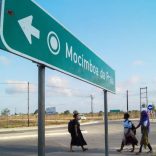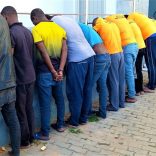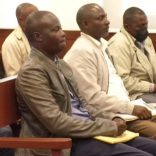Mozambique: Terrorists kill six in Mocimboa da Praia - AIM
Fear of attacks prompts exodus of residents in Cabo Delgado – Audio

Residents are reported to be abandoning homes, agriculture and fishing activities.
The intensification of insurgent attacks on villages in districts of Mozambican northern Cabo Delgado province has worsened the already precarious survival of thousands of people who depend on agriculture and fishing there.
The population now fears going to agricultural plots and the coast in the districts of Macomia, Palma and Mocímboa da Praia.
ALSO READ: Cabo Delgado Provincial Court has a new Judge President
It is estimated that more than 30 people died in the three districts from May to July, mostly by beheading, after the attacks had slowed immediately following the passage of Cyclone Kenneth in April.
It is unclear how many people the attacks have affected, as there is little information due to restrictions on access to the area by journalists and the authorities’ refusal to make statements to the press.
Some residents told have VOA that the number of deserted villages has increased, and that there are more people without access to farmland and the coast, a situation that is already leading to hunger.
“There are people who have been decapitated on the farms, some while harvesting cassava,” a resident of a village in Pundanhar, Palma, said, on condition of anonymity.
Another resident of Macotata, in the interior of Palma, revealed that residents had abandoned the second growing season, worsening their situation after losing their scant reserves to cyclones, and increasing the number of people in need of food assistance.
“No one wants to go to the farms anymore, because everything is uncertain. Many are afraid of being taken for insurgents or military – even women,” he said, adding: “Many prefer to face hunger instead of death,” and pointing out that roads to agricultural and fishing areas had been ambushed.
Another resident, from a fishing village in Macomia, said the situation was disturbing.
“There’s hunger here, it’s that dramatic. People are even afraid to go to the well to fetch water, while they have nothing to eat and drink at home,” he said, adding that the decline in farming and fishing would have consequences on the health of the population.
Many produce storehouses, mainly for cassava, the food staple in the region, have been burned down during attacks, and the FAO estimates that, even before the passage of cyclones Idai and Kenneth in March and April and the intensification of the attacks in Cabo Delgado, 1.8 million people were facing serious food insecurity.
According to residents’ reports, Defence and Security Force (FDS) presence in several villages was reduced shortly after the end of the voter registration in order to concentrate actions on the gas and oil megaprojects in the Rovuma basin.
The Mozambican government has attributed several motivations to the insurgents, and last week has extended the already extensive list to include the “economic sabotage” of megaprojects in Cabo Delgado.
The Deputy Attorney General of the Republic, Amabélia Chuquela, warned last Wednesday of the possibility of armed attacks in the province spreading to other provinces if urgent measures fail to definitively dismantle the group terrorising districts north of Pemba.
So far, the two trials in the Judicial Court of Cabo Delgado have condemned 61 people of participating in the insurgency and acquitted 138 others. In April, the court convicted 37 defendants and acquitted 133, in June again convicting 24 and acquitting five.
By André Baptista












Leave a Reply
Be the First to Comment!
You must be logged in to post a comment.
You must be logged in to post a comment.